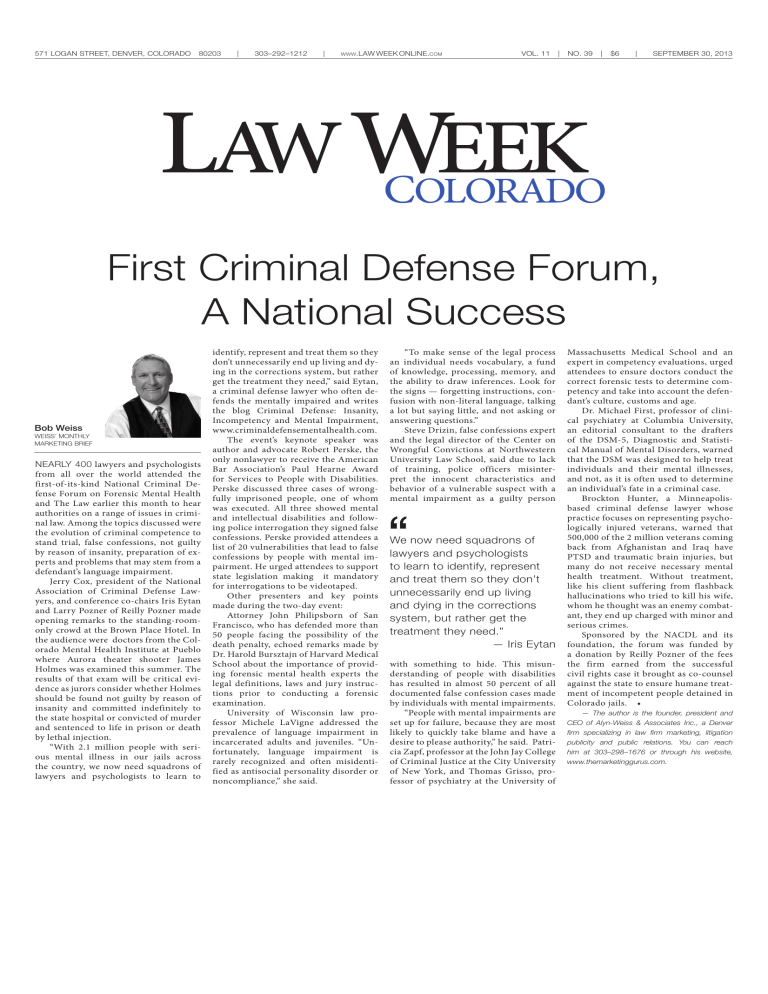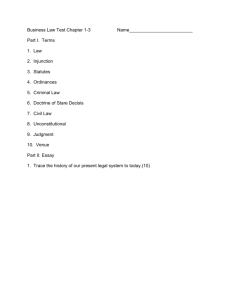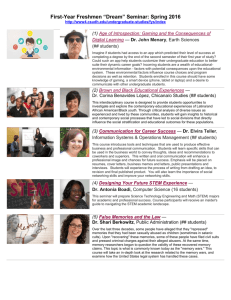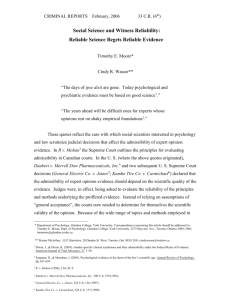First Criminal Defense Forum, A National Success

DENVER, www
.
LAW WEEK ONLINE .
com
First Criminal Defense Forum,
A National Success
Bob Weiss
WEISS’ MONTHLY
MARKETING BRIEF
NEARLY 400 lawyers and psychologists from all over the world attended the first-of-its-kind National Criminal Defense Forum on Forensic Mental Health and The Law earlier this month to hear authorities on a range of issues in criminal law. Among the topics discussed were the evolution of criminal competence to stand trial, false confessions, not guilty by reason of insanity, preparation of experts and problems that may stem from a defendant’s language impairment.
Jerry Cox, president of the National
Association of Criminal Defense Lawyers, and conference co-chairs Iris Eytan and Larry Pozner of Reilly Pozner made opening remarks to the standing-roomonly crowd at the Brown Place Hotel. In the audience were doctors from the Colorado Mental Health Institute at Pueblo where Aurora theater shooter James
Holmes was examined this summer. The results of that exam will be critical evidence as jurors consider whether Holmes should be found not guilty by reason of insanity and committed indefinitely to the state hospital or convicted of murder and sentenced to life in prison or death by lethal injection.
“With 2.1 million people with serious mental illness in our jails across the country, we now need squadrons of lawyers and psychologists to learn to identify, represent and treat them so they don’t unnecessarily end up living and dying in the corrections system, but rather get the treatment they need,” said Eytan, a criminal defense lawyer who often defends the mentally impaired and writes the blog Criminal Defense: Insanity,
Incompetency and Mental Impairment, www.criminaldefensementalhealth.com.
The event’s keynote speaker was author and advocate Robert Perske, the only nonlawyer to receive the American
Bar Association’s Paul Hearne Award for Services to People with Disabilities.
Perske discussed three cases of wrongfully imprisoned people, one of whom was executed. All three showed mental and intellectual disabilities and following police interrogation they signed false confessions. Perske provided attendees a list of 20 vulnerabilities that lead to false confessions by people with mental impairment. He urged attendees to support state legislation making it mandatory for interrogations to be videotaped.
Other presenters and key points made during the two-day event:
Attorney John Philipsborn of San
Francisco, who has defended more than
50 people facing the possibility of the death penalty, echoed remarks made by
Dr. Harold Bursztajn of Harvard Medical
School about the importance of providing forensic mental health experts the legal definitions, laws and jury instructions prior to conducting a forensic examination.
University of Wisconsin law professor Michele LaVigne addressed the prevalence of language impairment in incarcerated adults and juveniles. “Unfortunately, language impairment is rarely recognized and often misidentified as antisocial personality disorder or noncompliance,” she said.
“To make sense of the legal process an individual needs vocabulary, a fund of knowledge, processing, memory, and the ability to draw inferences. Look for the signs — forgetting instructions, confusion with non-literal language, talking a lot but saying little, and not asking or answering questions.”
Steve Drizin, false confessions expert and the legal director of the Center on
Wrongful Convictions at Northwestern
University Law School, said due to lack of training, police officers misinterpret the innocent characteristics and behavior of a vulnerable suspect with a mental impairment as a guilty person
We now need squadrons of lawyers and psychologists to learn to identify, represent and treat them so they don’t unnecessarily end up living and dying in the corrections system, but rather get the treatment they need.”
— Iris Eytan
with something to hide. This misunderstanding of people with disabilities has resulted in almost 50 percent of all documented false confession cases made by individuals with mental impairments.
“People with mental impairments are set up for failure, because they are most likely to quickly take blame and have a desire to please authority,” he said. Patricia Zapf, professor at the John Jay College of Criminal Justice at the City University of New York, and Thomas Grisso, professor of psychiatry at the University of
Massachusetts Medical School and an expert in competency evaluations, urged attendees to ensure doctors conduct the correct forensic tests to determine competency and take into account the defendant’s culture, customs and age.
Dr. Michael First, professor of clinical psychiatry at Columbia University, an editorial consultant to the drafters of the DSM-5, Diagnostic and Statistical Manual of Mental Disorders, warned that the DSM was designed to help treat individuals and their mental illnesses, and not, as it is often used to determine an individual’s fate in a criminal case.
Brockton Hunter, a Minneapolisbased criminal defense lawyer whose practice focuses on representing psychologically injured veterans, warned that
500,000 of the 2 million veterans coming back from Afghanistan and Iraq have
PTSD and traumatic brain injuries, but many do not receive necessary mental health treatment. Without treatment, like his client suffering from flashback hallucinations who tried to kill his wife, whom he thought was an enemy combatant, they end up charged with minor and serious crimes.
Sponsored by the NACDL and its foundation, the forum was funded by a donation by Reilly Pozner of the fees the firm earned from the successful civil rights case it brought as co-counsel against the state to ensure humane treatment of incompetent people detained in
Colorado jails. •
— The author is the founder, president and
CEO of Alyn-Weiss & Associates Inc., a Denver firm specializing in law firm marketing, litigation publicity and public relations. You can reach him at 303–298–1676 or through his website, www.themarketinggurus.com.







